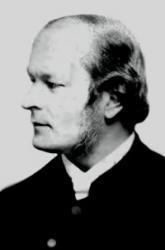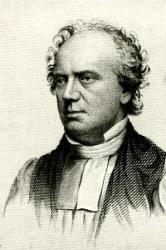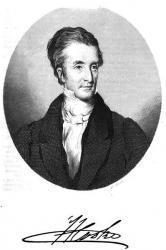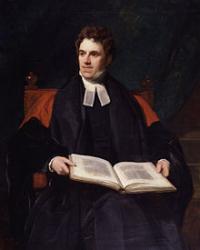Planning worship?
Check out our sister site, ZeteoSearch.org,
for 20+ additional resources related to your search.
- |
User Links
Person Results
‹ Return to hymnal






Export as CSV
Frederick W. Farrar

1831 - 1903 Hymnal Number: d112 Author of "In the field [fields] with their flocks abiding" in In Excelsis for School and Chapel. l7th ed. Farrar, Frederic William, D.D., son of the Rev. Charles Penhorn Farrar, sometime a missionary in India, and late Rector of Sidcup, Kent. He was born at Bombay, Aug. 7th, 1831; and educated at King William's College, Isle of Man, and at King's College, London. In 1850 he obtained a classical exhibition, and in 1852 a scholarship at the University of London, whence, after taking the degree of B.A., he passed to Trinity College, Cambridge. There, in 1852, he took (with other prizes) the Chancellor's Prize in English verse, and graduated in first-class classical honours in 1854. In the same year he entered Holy Orders, and was subsequently for some time an assistant master at Harrow School. In 1871 he was appointed to the head mastership of Marlborough College, which he held until 1876, when he was nominated a Canon of Westminster Abbey and Rector of St. Margaret's, Westminster. He had previously been chosen Select Preacher before the University of Cambridge in 1868, and again in 1874, 1875, and Hulsean Lecturer in 1870. He was also appointed in 1869 a Chaplain to the Queen, and in 1883, Archdeacon of Westminster. Archdeacon Farrar has achieved a high reputation both as a writer and a preacher.
He is the author of some volumes of fiction for the young which soon attained great popularity, as well as of several important works in the departments of philology and theology. Of the latter, his Life of Christ and Life and Work of St. Paul are the best known. As a preacher, Archdeacon Farrar stands in the first rank as a master of graceful eloquence. His contributions to hymnody include, "Father, before Thy throne of light," "God and Father, great and holy," and a beautiful carol, "In the fields with their flocks abiding." [George Arthur Crawford, M.A.]
--John Julian, Dictionary of Hymnology (1907)
==================
Farrar, F. W. , p. 365, ii. Dr. Farrar became Dean of Canterbury in 1895, and died at Canterbury, March 22, 1903. His Life, &c, by his son, was published in 1904.
--John Julian, Dictionary of Hymnology, New Supplement (1907)
Frederick W. Farrar
Francis Pott
1832 - 1909 Person Name: Francis Pott, 1832-1909 Hymnal Number: d14 Author of "Angel voices, ever singing" in In Excelsis for School and Chapel. l7th ed. Francis Pott studied at Brasenose College, Oxford, where he graduated B.A. in 1854, and M.A. in 1857. He was ordained Deacon in 1856, and Priest in 1857. He was Curate of Bishopsworth, Bristol, 1856; of Ardingley, Sussex, 1858; was appointed to Ticehurst in 1861; and is now incumbent of Northill, Bedfordshire. Mr. Pott has made many acceptable translations, and has edited "Hymns Fitted to the Order of Common Prayer, etc.;" a compilation of real merit.
--Annotations of the Hymnal, Charles Hutchins, M.A., 1872
============
Pott, Francis, M.A., was born Dec. 29, 1832, and educated at Brasenose, College, Oxford, B.A. 1854; M.A. 1857. Taking Holy Orders in 1856 he was curate of Bishopsworth, Gloucestershire, 1856-8; Ardingly, Berks, 1858-61; Ticehurst, Sussex, 1861-66; and Rector of Norhill, Ely, 1866. His
Hymns fitted to the Order of Common Prayer, and Administration of the Sacraments, and other Rites and Ceremonies of the Church, According to the Use of the Church of England, To which are added Hymns for Certain Local Festivals,
was published in 1861, and reprinted from time to time with a few additions. Mr. Pott contributed translations from the Latin and Syriac, and original hymns, including “Angel voices ever singing" (p. 68, ii.), and "Lift up your heads, eternal gates" (Ascension). These original hymns, together with his translations, have been received with much favour and are widely used. In several.…works, several translations from the Latin, and other hymnological work, are attributed to Archdeacon Alfred Pott. We are authorized to state that this ascription of authorship is an error.
--John Julian, Dictionary of Hymnology (1907)
Francis Pott
Frances Elizabeth Cox
1812 - 1897 Person Name: Frances E. Cox Hymnal Number: d123 Author of "Jesus lives, thy terrors now" in In Excelsis for School and Chapel. l7th ed. Cox, Frances Elizabeth, daughter of Mr. George V. Cox, born at Oxford, is well known as a successful translator of hymns from the German. Her translations were published as Sacred Hymns from the German, London, Pickering. The 1st edition, pub. 1841, contained 49 translations printed with the original text, together with biographical notes on the German authors. In the 2nd edition, 1864, Hymns from the German, London, Rivingtons, the translations were increased to 56, those of 1841 being revised, and with additional notes. The 56 translations were composed of 27 from the 1st ed. (22 being omitted) and 29 which were new. The best known of her translations are "Jesus lives! no longer [thy terrors] now" ; and ”Who are these like stars appearing ?" A few other translations and original hymns have been contributed by Miss Cox to the magazines; but they have not been gathered together into a volume.
-- John Julian, Dictionary of Hymnology (1907)
Frances Elizabeth Cox
Francis Scott Key

1779 - 1843 Hymnal Number: d183 Author of "O say can you see by the dawn's early light" in In Excelsis for School and Chapel. l7th ed. Frances Scott Key USA 1779-1843. Born in Frederick County, MD, and educated at St. John’s College, Annapolis, MD, a devout Episcopalian, he practiced law in Washington, DC for four decades. He was U.S. District Attorney for the District of Columbia until his death. He argued some of his cases at the Supreme Court. Key served briefly in a Georgetown militia unit. He married Mary Tayloe Lloyd in 1802, and they had eleven children: Elizabeth, Maria, Francis, John, Anna. Edward, Daniel, Philip, Ellen, Maria, and Charles. He also wrote a few hymn lyrics. During the War of 1812, which Key was against, the British invaded the U.S. and burned the White House, Capitol Building, and Library of Congress. One of Key’s friends, Dr. William Beanes, accused of helping in the arrest of British soldiers, was taken prisoner by the British. With the permission of President James Madison, Keys went to Baltimore to try to secure his release with a prisoner exchange. Sailing on a sloup flying a flag of truce for several miles at sea, they found the Tonnant, the ship Beanes was held on, and finally negotiated the release, After showing the British letters from grateful wounded British troups that had been treated by Dr. Beanes. They tried to leave the area, but were temporarily prevented, as the British were bombarding Fort McHenry. Major George Armistead, Commander of Ft. McHenry, had asked that a large flag be made so British vessels could see it over the fort from a great distance. The flag made of cotton bunting was 24 x30 feet in size. When hoisted, it looked huge. Detained, and watching from a ship about eight miles away, Key saw the British fail to destroy the Fort, or even the flag flying over it. The British could not move in cfloser with their ships, as close-range bombardment from Americans had already sunk 22 vessels. After firing 1500 bomb shells, each weighing as much as 220 lbs. from a distance of several miles out the British gave up trying. Key penned his famous lines about the incident, then finished the poem in a hotel room later. The poem was printed in newspapers, and soon a popular drinking tune, “Anacreon in Heaven”, by John Stafford Smith, was chosen to accompany it, and people began referring to the song as “the star-spangled banner”. Four stanzas were written, but usually only one verse, the first, is sung. Key’s brother-in-law, Joseph Nicholson, noted that Key’s words fit the song, so he took the poem to a printer in Baltimore and had it printed. Two known copies of the printing have survived. His famous song was sung in 1897 at baseball opening day ceremonies in Philadelphia. In 1899 the U.S. Navy adopted the song. In 1916, President Woodrow Wilson announced that it should be played at all official events. In 1918 it was sung during the 7th inning of the World Series . It was adopted as the National Anthem in March 1931. During WWII it was sung at every baseball game. Key was a slave owner for years, but an opponent of slave trafficking. He eventually became a leader of the American Colonization Society which sent freed slaves to Africa, and he freed his slaves, even giving free legal representation to some seeking their freedom. He also represented owners of run-away slaves. In 1841 Key became a member of President Andrew Jackson’s “kitchen cabinet” a group of informal close advisors that did not hold public office but met with the president from time to time. In 1823 Key helped found the Virginia Theological Seminary. He supported the Episcopal Church for decades, taking an active roll in Christ Church and St. John’s Church in Georgetown, and Trinity Church in Washington, DC. He served as a lay rector for many years, leading services and visiting the sick. Of his many poems, religious themes were frequent, and most of his works were printed, collected and published in New York as “Poems” in 1857. Key died in Baltimore, MD, of pleurisy. Honors include: two bridges names after him (in Arlington, VA & Baltimore, MD), St. John’s College auditorium, Inducted in Songwriter’s Hall of Fame, Key Hall at University of MD, a residence hall at George Washington U, a high school in rural MD, a middle school in Houston, TX, elementary schools in several states, a mall in MD, a Baltimore minor league baseball team, A San Francisco monument (torn down in 2020 by a radical group after a $140,000 renovation), a WWII Liberty ship, and a U.S. Navy submarine.
Special note: In 2001, after the 9/11 catastrophe in New York, Queen Elizabeth II allowed her guards at Buckingham Palace to play the song, and the next day, at St. Paul’s Cathedral, she joined in the singing of it at a memorial service.
John Perry
=================
Key, Francis Scott, was born in Frederick County, Maryland, 1779, and educated at St. John's College, Annapolis. He practised as a lawyer in Washington, District of Columbia, and was the United States District Attorney there till his death on Jan. 11, 1843. His poetical pieces, which were printed in various works, were collected and published in New York as Poems in 1857. His hymns in common use include:—
1. Before the lord we bow. National Thanksgiving. This Thanksgiving hymn for the 4th July was published in 1832, and was probably written for the celebration of that year. It is in use in Great Britain and America.
2. If life's pleasures charm [cheer] thee. The heart for God only. Appeared in The Christian Lyre, 1830.
3. Faith is the Christian's evidence. Faith.
4. Lord, with glowing heart I'll praise Thee. Praise for Pardon and Peace. Published in Dr. Mühlenberg's Church Poetry, 1823, the Prayer Book Collection, 1826, &c.; and altered as "Lord, with fervor I would praise Thee," in the Unitarian Hymns for the Church of Christ, Boston, 1853. In the Oberlin, Ohio, Manual of Praise, 1880, it begins with st. ii., "Praise, my soul, the God that sought thee."
Of these hymns Nos. 1, 2, and 4 are in the Lyra Sacra Americana, 1868, together with the following:—
5. Behold the grant the King of kings. All things in Christ.
6. My God, my Father, may I dare. God, the Father.
7. When troubles, wave on wave, assail'd. Efficacy of Prayer.
F. S. Key was also the author of "The Star Spangled Banner" (1814). For original text of his pieces see the Poems, 1857. [Rev. F. M. Bird, M.A.]
-- John Julian, Dictionary of Hymnology (1907)
Francis Scott Key
William Crosswell

1804 - 1851 Person Name: William Croswell Hymnal Number: d143 Author of "Lord, lead the way the [my] [our] Savior went" in In Excelsis for School and Chapel. l7th ed. Crosswell, William, D.D., was born at Hudson, N.Y., Nov. 7, 1804; graduated at Yale College, 1822; entered for a time upon law studies, but eventually he entered Hartford College as a Theological Student, and then took Holy Orders in the Protestant Episcopal Church in 1829. In 1829 he became Rector of Christ Church, Boston; in 1840, of St. Peter's, Auburn, New York; and in 1844, of the Church of the Advent, Boston. Died suddenly at Boston, Nov. 9, 1851. Whilst at Hartford he assisted, during 1827-28, in editing The Watchman, and contributed to it many of his poetical pieces. His Memoir was written by his father, the Rev. Dr. Crosswell, of New Haven; and his Poems, collected by his father, were edited, with a short Memoir, by Dr. (now Bishop) Coxe, and published at Boston in 1800. Of his hymns the folowing are in common use:—
1. Lord, go with us, and we go. Journeying. This in Hymns for the Church and Home, 1860, No. 212, is a portion of his "Traveller's Hymn," first published in 1833. Concerning it Dr. Coxe says, "When on a journey with him, I reminded him of his 'Traveller's Hymn,' which I had seen but could not remember; and he told me, if I recollect aright, that it was a sort of Impromptu, which bubbled up when he was going with Dr. Wainwright from Boston to New York to attend the General Convention" (Memoir, p. xlii.); and in his notes, p. 282, he indirectly fixes the date of composition as 1832. Orig. text in 2 stanzas of 8 lines, in Poems, p. 255.
2. Lord, lead the way the Saviour went. For Sisters of Mercy. Written in 1831 for the Howard Benevolent Society of Boston. Dr. Coxe has entitled it "Hymn forSisters of Mercy," and says he "ventured to give it a name suited to the present state of the Church, in which Deaconesses and Sisters of Mercy are among other realizations of the poet's ardent hopes. Perhaps we owe them to his faithful prayers." (Notes to the Poems, p. 283.) It is generally accepted as the best American hymn for benevolent occasions. Original text, Poems, p. 256.
3. Now gird your patient loins again. Advent. This hymn for Advent is in 3 stanzas of 4 lines. Poems, p. 209; Hymns for Church and Home, No. 55.
4. 0 Saviour, leave us not alone. Lent. This is from his hymn for Lent beginning, "Thou who, for forty days and nights," in 4 stanzas of 4 double lines. In its abbreviated form it is found in Hymns for Church and Home, No. 85. Original in Poems, p. 219, in 4 stanzas of 4 double lines.
5. We come not with a costly store. Epiphany. For the Epiphany, from his Poems, p. 215, and based upon the Gospel of the day, in 2 stanzas of 8 lines.
6. And now the solemn rite is past. Ordination. This is composed of stanzas vii., viii. of his poem, "The Ordinal," in Poems, pp. 69-71, slightly altered. "The Ordinal" was written in 1828, and describes minutely his own ordination at his father's church, at New Haven, and the feel¬ings inspired, by the solemnity. It was printed in The Watchman, 1828. (Poems, Preface, p. xxvii.) The portion given as "And now the solemn rite is past" was included in Hall's Mitre, 1836.
Dr. Crosswell also translated the "Veni, Creator Spiritus" as "Creator, Spirit, come and bless us." His hymns are mostly unknown to the English collections. [Rev. F. M. Bird, M.A.]
--John Julian, Dictionary of Hymnology (1907)
=================
Crosswell, W., p. 269, ii. On the title-page of his Poems, 1861, this author is given as W. Croswell, and the best authorities are in favour of this spelling of the name.
--John Julian, Dictionary of Hymnology, New Supplement (1907)
William Crosswell
Thomas Benson Pollock

1836 - 1896 Hymnal Number: d119 Author of "Hear us, holy Jesus" in In Excelsis for School and Chapel. l7th ed. Pollock, Thomas Benson, M.A., was born in 1836, and graduated at Trinity College, Dublin, B.A. 1859, M.A. 1863, where he also gained the Vice-Chancellor's Prize for English Verse in 1855. Taking Holy Orders in 1861, he was Curate of St. Luke's, Leek, Staffordshire; St. Thomas's, Stamford Hill, London; and St. Alban's, Birmingham. Mr. Pollock is a most successful writer of metrical Litanies. His Metrical Litanies for Special Services and General Use, Mowbray, Oxford, 1870, and other compositions of the same kind contributed subsequently to various collections, have greatly enriched modern hymnbooks. To the 1889 Supplemental Hymns to Hymns Ancient & Modern, Mr. Pollock contributed two hymns, “We are soldiers of Christ, Who is mighty to save" (Soldiers of Christ), and "We have not known Thee as we ought" (Seeking God), but they are by no means equal to his Litanies in beauty and finish.
-- John Julian, Dictionary of Hymnology (1907)
===================
Pollock, T. B. , 900, i. We note:—
1. God of mercy, loving all. Litany for Quinquagesima. In the Gospeller, 1872.
2. Great Creator, Lord of all. Holy Trinity. In the Gospeller, 1876.
3. Holy Saviour, hear me; on Thy Name I call. Litany of the Contrite. In the Gospeller, 1870. From it "Faithful Shepherd, feed me in the pastures green," is taken.
4. Jesu, in Thy dying woes, p. 678, ii. 36. Given in Thring's Collection, 1882, in 7 parts, was written for the Gos¬peller.
5. My Lord, my Master, at Thy feet adoring. Passiontide. Translation of "Est-ce vous quo je vois, 6 mon Maître adorable!" (text in Moorsom's Historical Comp. to Hymns Ancient & Modern, 1889, p. 266), by Jacques Bridaine, b. 1701, d. 1767. Moorsom says he was born. at Chuselay, near Uzes, in Languedoc, and was a Priest in the French Church. The translation made in 1887 was included in the 1889 Supplemental Hymns to Hymns Ancient & Modern.
6. We are soldiers of Christ, p. 900, i. In the Gospeller, 1875.
7. Weep not for Him Who onward bears. Passiontide. No. 495 in the 1889 Suppl. Hymns to Hymns Ancient & Modern is part of a hymn in the Gospeller, 1870.
--John Julian, Dictionary of Hymnology, Appendix, Part II (1907)
Thomas Benson Pollock
H. Cooke

1788 - 1868 Hymnal Number: d130 Author of "Jesus, Shepherd of the sheep, who thy father's flock" in In Excelsis for School and Chapel. l7th ed. Cooke, Henry, D.D., LL.D., was born at Grillagh, near Maghera, County Londonderry, Ireland, May 11, 1788, and was educated at the University of Glasgow. He became pastor of Dueane Presbyterian Church in 1808. After holding other pastorates he was appointed to that of the Presbyterian congregation in May Street, Belfast. He died in Belfast, Dec. 13, 1868. His Life was published by Dr. J. L. Porter, in 1871. The hymn, "Jesus, Shepherd of the Sheep, Who Thy Father's flock," &c. (The Good Shepherd ), in the Canadian Presbyterian Hymn Book, 1880, is by him.
--John Julian, Dictionary of Hymnology, Appendix, Part II (1907)
H. Cooke
H. J. B.
1803 - 1871 Person Name: Henry James Buckoll Hymnal Number: d38 Author of "Come, my soul, thou [you] must be waking" in In Excelsis for School and Chapel. l7th ed. =========
Buckoll, Henry James, M.A., son of the Rev. James Buckoll, Rector of Siddington, near Cirencester, Gloucester; born at Siddington, Sept. 9,1803. He was educated at Rugby and Queen's College, Oxford, graduating B.A.in 1826, and became Assistant Master at Rugby the same year. He took Holy Orders in 1827, and died at Rugby June 6, 1871. He was probably the editor of the first edition of the Rugby School Collection. In 1839 he edited a Collection of Hymns for the Rugby Parish Church, and in 1850 compiled, with Dr. Goulburn, a new edition of the Collection for the Rugby School Chapel. That collection contains 14 of his hymns, a few of which were translations from the Latin and German. His Hymns translated from the German were published 1842. It contained 67 translations from Bunsen's Versuch, 1833, most of which are in the original metres, and are annotated in this work under their first lines in German. Buckoll's hymns and trs. are mostly found in the hymn-books of the Public Schools.
-- John Julian, Dictionary of Hymnology (1907)
H. J. B.
Lydia Avery Coonley Ward
1845 - 1924 Person Name: L. A. Coonley Hymnal Number: d2 Author of "A shining star came from afar" in In Excelsis for School and Chapel. l7th ed.
Lydia Avery Coonley Ward
Thomas Arnold

1795 - 1842 Hymnal Number: d38 Author of "Come, my soul, thou [you] must be waking" in In Excelsis for School and Chapel. l7th ed.
Thomas Arnold


 My Starred Hymns
My Starred Hymns


